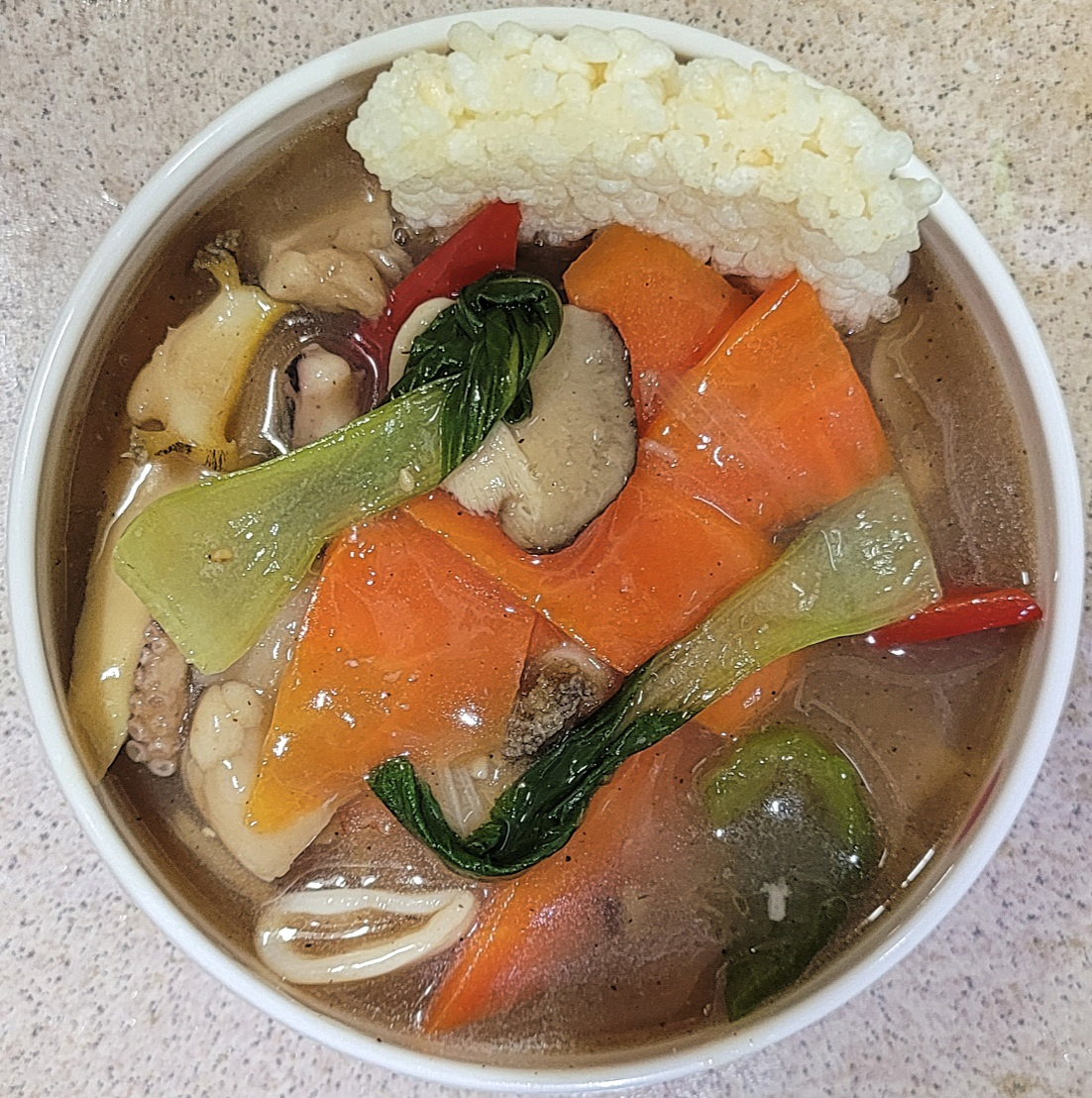Elegant Seafood and Crispy Rice Soup (Haemul Nurungji Tang)
Homemade Restaurant-Style Seafood and Crispy Rice Soup

Elevate your home cooking with this impressive seafood and crispy rice soup, inspired by upscale restaurant dishes! Enjoy the delightful contrast between the tender seafood, crisp rice crackers, and a rich, savory broth. It’s perfect for special occasions or when you want to impress guests.
Main Ingredients- Garlic, 5-6 cloves, minced
- Ginger, 1 small piece, minced
- Scallions, 1.5 stalks (use both white and green parts)
- Carrot, 1/2 medium
- Shiitake mushrooms, 3 medium
- Red bell pepper, 1/2 medium
- Green bell pepper, 1/2 medium
- Medium-sized abalone, 2 pieces
- Bok choy, 2 heads
- Canned bamboo shoots, 1 can
- Scallop slices (pre-sliced), 90g
- Cooked shrimp, a small amount
- Mixed seafood (frozen or fresh), 2 handfuls
- Glutinous rice crackers (nurungji), 2 pieces
- Cooking oil (enough to deep-fry the nurungji)
Slurry (for thickening)- Water, 7.5 Tbsp
- Cornstarch or potato starch, 3 Tbsp
Seasoning and Broth- Soy sauce (brewing or regular), 2-3 Tbsp
- Cooking wine (mirin), 2 Tbsp
- Chicken stock, 1 cup (approx. 200ml)
- Oyster sauce, 1.5 Tbsp
- Black pepper, 1/2 Tbsp
- Sesame oil, a little
- Water, 7.5 Tbsp
- Cornstarch or potato starch, 3 Tbsp
Seasoning and Broth- Soy sauce (brewing or regular), 2-3 Tbsp
- Cooking wine (mirin), 2 Tbsp
- Chicken stock, 1 cup (approx. 200ml)
- Oyster sauce, 1.5 Tbsp
- Black pepper, 1/2 Tbsp
- Sesame oil, a little
Cooking Instructions
Step 1
If using fresh scallops, pre-sliced ones from stores like E-mart are convenient. If frozen, thaw them and pat dry.

Step 2
Thoroughly scrub the fresh abalone with a brush. Be sure to remove the hard ‘teeth’ from the underside of the abalone shell for a better eating experience.

Step 3
Scoring the abalone meat makes it more tender. Create a diamond pattern with shallow cuts on the abalone surface. Slice it to about 0.5 cm thickness, ensuring not to cut too thin.

Step 4
Slice the abalone to a bite-sized thickness for a pleasant chew, rather than slicing it too thinly.

Step 5
For cooked shrimp, make a cut along the back and clean out any vein (intestinal tract) that might be present.

Step 6
Drain the canned bamboo shoots and slice them thinly (about 0.3-0.5 cm thick) into attractive shapes.

Step 7
Remove the stems from the shiitake mushrooms and slice them thinly, about 0.3-0.5 cm thick. (Lightly blanching them beforehand can enhance their flavor.)

Step 8
Cut the scallions in half lengthwise, then chop them into roughly 1 cm pieces (about the thickness of a pinky finger) to release their aroma when cooked.

Step 9
Remove the seeds from the red and green bell peppers, then slice them into bite-sized pieces, about 1.5 cm, in diamond or rhombus shapes for an appealing presentation.

Step 10
Peel the garlic cloves and slice them thinly, about 0.3 cm thick, avoiding slices that are too thin.

Step 11
Wash the bok choy thoroughly. If the leaves are large, cut them in half lengthwise for easier eating.

Step 12
Slice the carrot into similar sizes and shapes (diamond or rhombus) as the bell peppers for a cohesive look. This adds a lovely color contrast.

Step 13
Pour a generous amount of cooking oil (enough to submerge the nurungji) into a deep pan or wok and heat over medium heat. Oils with a high smoke point, like canola or grapeseed oil, are recommended.

Step 14
Add the glutinous rice crackers (nurungji) to the hot oil. Once they float, gently press them down with chopsticks or a spatula to help them puff up evenly. When they turn golden brown and puffed, quickly remove them and place them on paper towels to drain excess oil.

Step 15
Drain most of the frying oil, leaving about 2-3 Tbsp in the pan. Add the sliced garlic and scallions to the remaining oil and stir-fry over medium-low heat until fragrant. If you have minced ginger, add it now and sauté with the garlic and scallions.

Step 16
Once the scallions and garlic are golden brown, add the prepared abalone, scallops, shrimp, mixed seafood, bamboo shoots, and shiitake mushrooms. Stir-fry over high heat for about 1 minute. Drizzle in the cooking wine and soy sauce to infuse the ingredients with flavor.

Step 17
After the seafood and vegetables are partially cooked, add the prepared bok choy and stir-fry quickly over high heat for just 30 seconds to keep it crisp and vibrant.

Step 18
Pour in 1 cup of chicken stock and mix well. Bring to a boil over high heat. (If you don’t have chicken stock, you can mix water with chicken powder.)

Step 19
Once the soup boils, add another cup of water and 1.5 Tbsp of oyster sauce for seasoning. Stir everything together evenly.

Step 20
Add 1/2 Tbsp of black pepper at this stage to enhance the aroma. Taste and adjust seasoning with salt or more soy sauce if needed, according to your preference.

Step 21
When the soup comes to another boil, gradually add the prepared starch slurry in 2-3 additions, stirring constantly until you reach a smooth, slightly thickened consistency, similar to a creamy soup. Be careful not to make it too thick.

Step 22
Once the desired thickness is achieved, turn off the heat. Drizzle in a little sesame oil for gloss and a nutty aroma, then gently mix.

Step 23
Ladle the finished seafood and crispy rice soup into a preheated 3-4 serving tteokbaegi (earthenware pot) or a deep serving bowl. Serve immediately with the crispy fried nurungji on the side for guests to enjoy.



